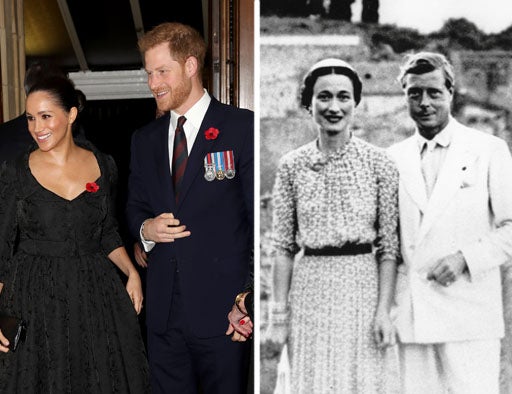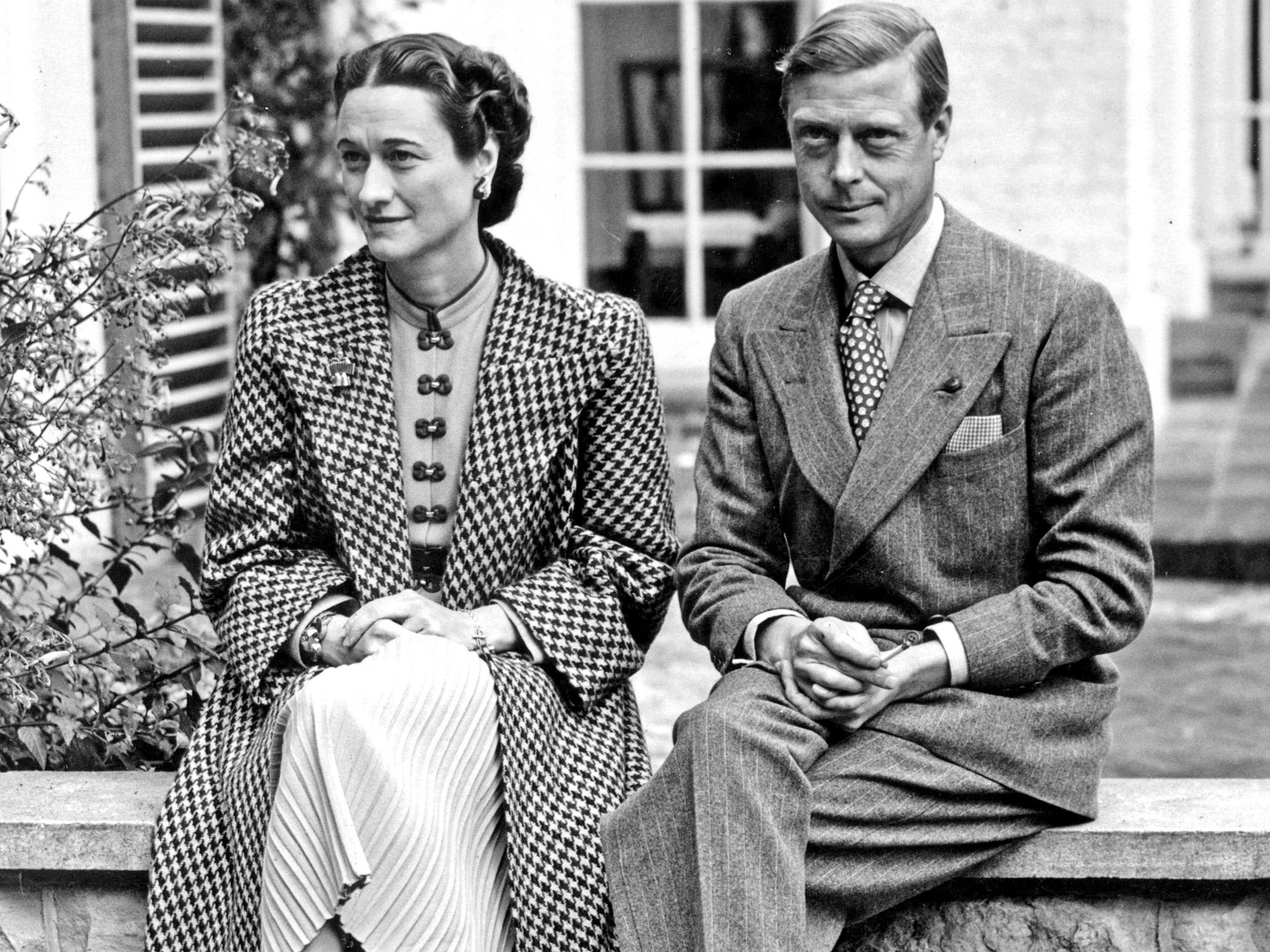The other American: Should we compare Meghan and Harry to Wallis and Edward?
As the couple step back from royal life in the UK, biographer Hugo Vickers asks if the Duke and Duchess of Sussex should be wary of history repeating itself


Your support helps us to tell the story
From reproductive rights to climate change to Big Tech, The Independent is on the ground when the story is developing. Whether it's investigating the financials of Elon Musk's pro-Trump PAC or producing our latest documentary, 'The A Word', which shines a light on the American women fighting for reproductive rights, we know how important it is to parse out the facts from the messaging.
At such a critical moment in US history, we need reporters on the ground. Your donation allows us to keep sending journalists to speak to both sides of the story.
The Independent is trusted by Americans across the entire political spectrum. And unlike many other quality news outlets, we choose not to lock Americans out of our reporting and analysis with paywalls. We believe quality journalism should be available to everyone, paid for by those who can afford it.
Your support makes all the difference.There is a temptation to compare Harry and Meghan’s departure to the abdication of Edward VIII in 1936. Obviously it is not as momentous as the king’s decision to cease reigning over the United Kingdom and the empire, effectively giving up ruling over two thirds of the world’s population. Harry’s departure may well just be but a blip in the long history of the royal family. But, on the other hand, it highlights the dilemma faced by those born to a life of service and how this can clash with their inner hopes and desires.
Having studied the Duke and Duchess of Windsor and the abdication saga for fifty years, I have reached certain conclusions; Prince Harry would do well to examine their fate too.
Prince Edward and Wallis Simpson’s relationship was portrayed as the “greatest love story of the twentieth century” but it was not. The world loved the Prince but those who knew him and worked for him had serious reservations. On the other hand, the world loathed Mrs Simpson, but those who knew her and worked for her, liked and appreciated her.
Cecil Beaton wrote in 1972: “History will make his love story into a romance. In fact, for us so close, it is hard to see that. I like [Wallis]. She is a good friend to all her friends. There is no malice in her. There is nothing dislikeable. She is just not of the degree that has reason to be around the throne.”

Edward VIII did not wish to be king and there was well-documented evidence of his desire to escape. Although the Duke professed to be laying down his biggest burden as he left, he really had no idea of how cold the world would soon become.
He hoped to return to Fort Belvedere [his residence in Surrey]. He hoped to reinvent himself as a younger brother, with his wife by his side. He expected her to be made HRH and looked forward to his family attending his wedding. None of these things happened. In fact, the Duke found himself in self-imposed exile for the next thirty-five years. There was a spell as Governor of the Bahamas but that was largely to keep him out of harm’s way during the Second World War.
His life became pointless. He surrendered his duty in favour of the path of perceived happiness. He adored his wife, but then he had to. The Windsor's secretary once told me: wasn’t it wonderful that whenever the Duchess went to the hairdresser, she would come down the stairs and he would come down in the lift – to see her into the car? And wasn’t it also wonderful that when she came back, he would be there to meet her? I know what she meant but it must have been claustrophobic. If you want a spaniel, buy one – don’t marry one.
The Duchess of Windsor also looked after the Duke very well in his new life – he ate better food in more beautiful surroundings in the second half of his life than in the first. She helped him maintain the myth of the great love story. If she made a mistake, it was perhaps that she turned herself into the epitome of a royal duchess and created a miniature royal court in exile.
Like the Duke of Windsor, they head into uncharted waters...
Harry and Meghan’s future will be somewhat different. Like the Duke of Windsor, they head into uncharted waters. But they will have been advised that they can get their message across in a way unrestricted by royal protocol. To be fair to them, they have made it clear that they do not wish to be a burden on the British taxpayer and they have accepted that they must not trade on royal connections. This is both liberating and concerning.
They now rely on the promise of funding from different sources, which may or may not come, but will certainly come at a considerable price. Royal life has areas of protection. The Royal Family are not paid for what they do. They do their work for free. Their expenses and security are covered. Prince Harry may not enjoy the demands made in contracts in return for sponsorship.
Prince Harry claims to seek a more peaceful life. This is unlikely to happen. Nor do I get the impression that the Duchess of Sussex is seeking peace and quiet. From the start her line has been that there is so much to be done. I always thought her role model was Queen Rania of Jordan, proactive on behalf of her country.
It is sad that they did not give it a bit longer – the wedding, an occasion of great excitement, was but a year and a half ago. It takes time for things to settle down. They may also have found that short, sharp visits to the Commonwealth, spreading joy and excitement, were more effective than settling in Canada. No time for people to tire of them.
Of course Prince Harry will be sad to lose his military connections such as Captain-General of the Royal Marines. But if he is away for half the year, he will not be much use to these regiments. His speech on Sunday (19 January) gave a hint at annoyance at the way things turned out, but I detect that many doors have been left open for him, in a way that was not the case with the Duke of Windsor.
As to the future of the royal family, this has provided plenty of opportunity for pundits to examine where the monarchy is going. There is likely to be more impact on the personal fates of Harry and Meghan than on the monarchy itself. It survived the abdication, and has weathered many other dramas – not least Diana, Princess of Wales.
The Queen herself is in an unassailable position because she got it right. She has been steadfast in the way she has served this country. She does not complain and nor does she waver. In a 1992 documentary, Edward Mirzoeff’s Elizabeth R, she said she was happy having her programme mapped out months ahead. Even then, she conceded some of the younger members found this more difficult.
I suspect Prince Harry would have found his life easier, and indeed more peaceful had he worked within the system. Would this have happened had he not married? There you have the answer.
Join our commenting forum
Join thought-provoking conversations, follow other Independent readers and see their replies
Comments